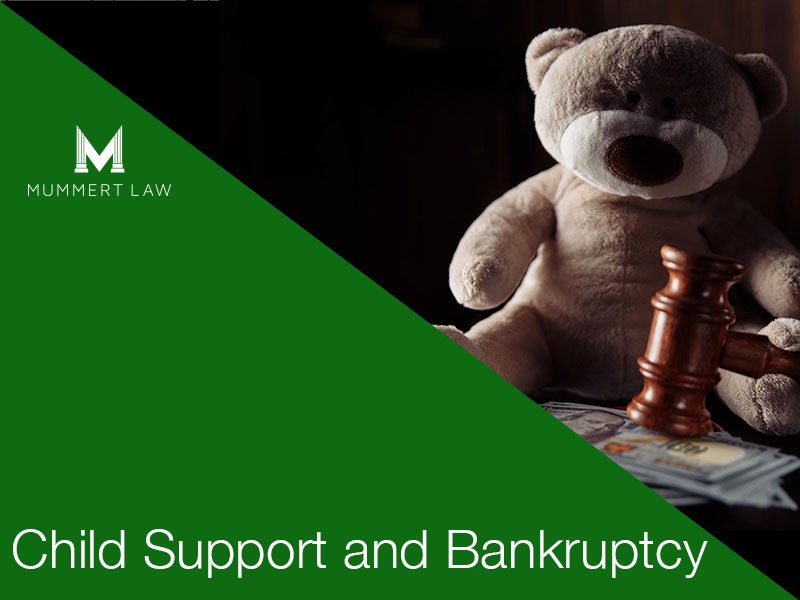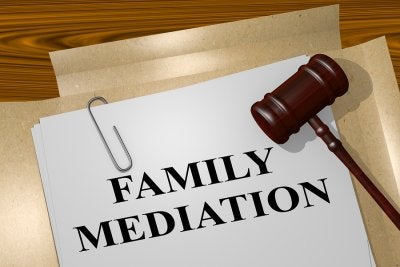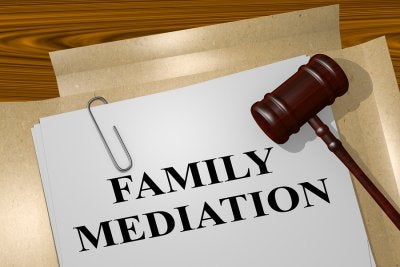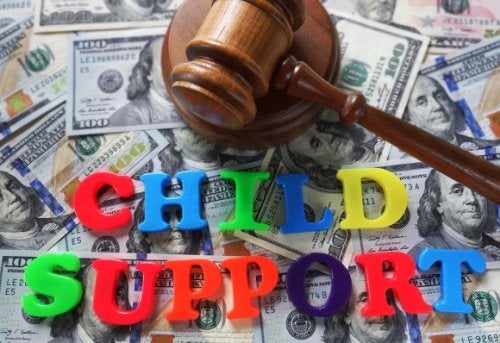-
Child Support and Bankruptcy

Child Support And Bankruptcy
Some parents paying or receiving Child Support find themselves in a financial situation that requires intervention. Bankruptcy is one way people can escape debt and face a better financial future.
Suppose you owe child support and plan to file bankruptcy, or your child’s co-parent is, it’s essential to understand how bankruptcy can affect child support. Bankruptcy will not change the mutual agreement or court-ordered child support obligations. But there are ways it can make recovering overdue child support easier and different types of relief available.
Types Of Bankruptcy
There are two types of bankruptcy for individuals: Chapter 7 and Chapter 13.
Those who meet certain income requirements can have all their unsecured debts forgiven under a Chapter 7 bankruptcy. However, the court may require selling some property or assets to repay creditors.
Those over the income requirements can still get relief through Chapter 13 bankruptcy but may have to pay back all their obligation.
Bankruptcy And Child Support Litigation Stay
How the court treats child support litigation, and bankruptcy depends on the type of bankruptcy.
Chapter 7 Bankruptcy
When filing a Chapter 7 bankruptcy, the courts put an automatic stay in place to prevent claims against you. But the stay does not stop actions from seeking past due child support or establishing child support. Proceedings in these matters can continue despite your Chapter 7 bankruptcy filing.
It’s also important to note that your income earned after filing Chapter 7 bankruptcy cannot be part of the bankruptcy estate. It can, however, determine child support obligations or pay arrearages.
Chapter 13 Bankruptcy
A Chapter 13 bankruptcy filing works differently. All earned income becomes part of the bankruptcy estate. The party seeking to impose a child support obligation can have the family court determine the amount of the child support.
Someone who is already subject to a child support order but fails to make the payments after filing Chapter 13 bankruptcy may find the court lifts the stay to allow recovery of support payments.
A Chapter 13 Plan must also address the past due child support obligations. Most of the time, all of the arrears must be paid to the Trustee and paid to the parent receiving the child support. There are exceptions. For example, if there is already an established arrearage payment, the Debtor may not be required to include the arrears in the Chapter 13 Plan if the arrears are satisfied during the bankruptcy.
How To Protect Child Support Payments From Bankruptcy Filing
Suppose you have money in the bank or cash from child support payments you received before filing for bankruptcy. In that case, it may become part of the bankruptcy estate. Maryland recognizes child support payments as exempt, meaning the bankruptcy trustee cannot use it to pay off creditors.
To ensure your child support money stays safe, it must be listed as an asset in your bankruptcy petition and properly exempted property. However, if it is comingled in a bank account with your normal earnings, it may have lost exemption. An experienced attorney will be able to trace the funds back to origination as well as other funds to be able to argue that it is still child support and should be exempt from distribution.
Child Support: A Priority Debt
Both federal and state court systems recognize the importance of providing for minor children. Whether you file for Chapter 7 or Chapter 13 bankruptcy, child support is not dischargeable in bankruptcy because it’s a priority debt. You will also be responsible for paying any overdue payments from your bankruptcy process.
As a priority debt, child support takes precedence and is one of the first obligations paid from a bankruptcy proceeding. You must pay child support in full as part of a Chapter 13 bankruptcy repayment plan before you receive a discharge from your debt obligations.
Ensuring Bankruptcy Doesn’t Affect Child Support
If you’re receiving child support or paying it, you want to ensure your child gets the care they need and the custodial parent the funds to do so. If you don’t already have a bankruptcy attorney, contact Mummert Law today to schedule a consultation to ensure bankruptcy doesn’t affect your child’s support payments.
-
Consensual Adoption

Consensual adoption usually represents a happy day and the best of circumstances. When a stepparent who has been raising a child gets to adopt that child and become their parent, officially and legally, the whole family has cause for celebration.
Steps to Consensual Adoption
First, the prospective parent files a Petition for Adoption. What happens next depends on consent. Consent means the biological parent has agreed to give up their parental rights and allow the proposed adoption to go forward. If there is no consent attached to the petition, the court issues a Show Cause Order. It is sent to the parent who is being asked to grant consent.
After being served, the parent who has been issued the Show Cause Order has thirty days to respond to that order. This is one of those situations in law where time is of the essence, and there is no wiggle room for procrastinators. In the absence of a response within 30 days, it is considered to mean consent is given. If you are planning to withhold consent, it is vital to reply and to make sure your reply reaches the court within the thirty-day window.Open vs. Closed Adoption
In a closed adoption, the biological parent no longer has parental rights. They may have been given up voluntarily or taken from them as a result of a “fitness” test. They do not have visitation rights nor the right to have any say in the rearing of the child.
In an open adoption, the biological parent may be granted limited access to the child going forward, as agreed by the two parties. Both parties will agree on when and under what conditions the parent has access to information about the child as he or she grows up, may visit the child, or have the ability to contact them.The Role of Mediation in Consensual Adoption
You may be wondering why you need an attorney or mediator if everything is agreed upon. The truth is, when it comes to matters of family law, such as adoption, it’s essential to have a legal and binding agreement. It’s also important to have a professional who is aware of all the issues involved in an adoption, whether it’s an open or closed adoption.
Put simply, people tend to change their minds over time. What they agree to today, they may challenge in the future. Having legal rights in this situation will prevent confusion in the future.
Things are different today than they were in the past. Through genetic family tracing, people are finding out as adults that the people he/she through were their parents are not actually their parents. Furthermore, parents who gave up all rights to children when they are young are having a person show up in their inbox or on their doorstep, asking if they are their biological parents.A mediator has the experience to know all the issues which can help create a durable plan for what happens in the future. A mediator can help both the adoptive parents to begin addressing these issues now, including suggestions of when the child may need counseling to address the age-old question of “Who am I?”
Why I’m Your Best Choice for a Mediator in Your Adoption Case
I’m a trained mediator, an attorney for children, and an attorney for parents. I’ve seen too many adversarial scenarios and the effect it has on the kids. Adoption through mediation is peaceful and best for everyone, from the individual to the whole family. Rely on my experience and care to guide you through the process with a minimum of drama and the best possible outcome.
-
What Is the Role of Children During the Custody Mediation Process?
Mediation is an effective alternative to court. During mediation sessions in Baltimore, a neutral third party helps parties who are at odds with each other explore the issues and discover mutually agreeable solutions. Mediation is useful for many situations, including family law matters such as child custody disputes. Even when parents have experienced significant breakdowns in communication, they may decide to attempt custody mediation in order to make the arrangements themselves, rather than entrust the custody decisions to a judge.

Children may have a limited role in custody mediation.
In most cases, children are not involved in settling custody disputes. Family law judges do not generally want to see minor children in the courtroom because of the significant stress this can inflict and the potential damage to family relationships. The same is true of custody mediation sessions. One of the goals of settling custody disputes is to avoid putting children in the middle; they should never feel as though they must choose one parent over the other. That being said, there may be some situations in which children can play a very limited role in custody mediation, provided that neither of the parents attempts to influence the children.
Children can aid in the identification of challenges.
Although children may not participate in the actual mediation sessions with all three parties, the mediator may decide to meet with the children separately to hold a low-stress discussion of the family situation. The mediator must be careful not to create a psychologically difficult situation for the children. Instead of asking a question such as, “Which parent would you rather live with?” the mediator might ask, “Who usually helps you with your homework?” The mediator might also prompt the children to identify challenges that may be settled during the mediation sessions. For example, a child might express concern about being able to participate in sports or other after-school activities despite the visitation schedule. The mediator can then bring these challenges into the mediation sessions and guide the parents in working toward solutions.
-
A Step-by-Step Guide to the Adoption Process in Maryland
Making the decision to adopt a child is a joyous occasion, but the process itself can often be tedious and confusing. If you intend to adopt a child, you can make an appointment with a lawyer in Baltimore who handles adoption cases. Your lawyer can walk you through the stages of the adoption process and provide legal representation if any problems arise.

Requirements
The requirements to adopt a child in Maryland are not unnecessarily strict. However, an adoptive parent must be at least 21 years of age. Adoptive parents may be single or married. If married, then both adoptive parents will be joined to the petition unless the couple is separated or the other parent is not legally competent. It is not necessary for adoptive parents to be affluent; however, they must have the financial means to provide for the child. Adoptive parents may be renters or homeowners. It is required to complete a 27-hour home study course before adopting a child through a public agency.
Consent
Under Maryland family law, the legal guardians of the adoptee must provide consent for the adoption. The legal guardians may be the birth parents or the adoption agency. If the court has terminated parental rights, then only agency consent is required. If the adoption is an independent adoption, the adoptive parents must obtain the consent of all legal guardians. However, the consent of only one parent may be needed if the other parent cannot be located, does not object to a published notice of adoption, and has not been in contact with the department for a certain length of time.
Petition
A lawyer will file a petition for adoption with the court, which will likely include supporting documents. Once the petition is filed, the court will send a notice to all of the involved parties and their attorneys.
Hearing
During the hearing, the judge will decide whether to grant or deny the petition for adoption. If it is an independent adoption, the court might require an investigation prior to granting the petition. If the matter is being facilitated by a private adoption agency, then the agency will need to submit a report prior to the hearing. During the hearing, the judge will consider whether the petitioners are fit to be adoptive parents, whether all necessary paperwork has been completed, and whether being adopted is in the best interests of the adoptee.
-
Preparing for Post-Divorce Mediation to Modify Child Support or Custody
It’s often expected that a divorce agreement will resolve family law issues beyond a shadow of a doubt. But in fact, many disputes can arise months or years after the divorce agreement was signed. For example, one party may wish to change the custody agreement or child support arrangement. If this applies to your situation, you can consult a mediation lawyer in Baltimore . He or she may recommend post-divorce mediation. Being well prepared for your mediation sessions can help you get the most out of them.

Gather Documents
Ahead of your first mediation session, you should gather together documents that are relevant to the case. Your lawyer can provide guidance on which specific documents or evidence will be useful for achieving your goals. For example, if you wish to increase the child support payments you’re receiving, you may need evidence that demonstrates that the child’s financial needs are increasing. These might include medical bills or receipts for extracurricular activities. Perhaps you wish to modify the visitation schedule. For example, you might argue that your child’s grades are declining because of the back-and-forth visitation during the week days. Gather together your child’s report card, progress reports, notes from teachers, and similar evidence.
Prepare Proposals
You likely already have a clear idea of what you would like to accomplish in post-divorce mediation. But it can be even more helpful to put your proposal into writing. For example, you might develop one or more alternative schedules of visitation. If you want your child with you during the entire week, you’ll need to be prepared to increase visitation during other times such as school vacations, holidays, and weekends. Understand that it’s unlikely that your proposal will be accepted exactly as is. However, it can provide a good starting point for the discussion.
Adjust Your Mindset
Before going into mediation, your lawyer may counsel you to adjust your mindset. Mediation is intended to resolve conflicts in a mutually agreeable way . It’s expected that parties involved with mediation may not be on the best of terms, but entering mediation with a confrontational mindset is counterproductive. Remind yourself that you’ll have to be willing to compromise to make progress. You might even identify areas where you’re willing to compromise before your session with the mediator.
-
How Can I Pay Child Support in Maryland?
Child support consists of monetary contributions paid by a noncustodial parent to the custodial parent to provide for a child’s daily needs. Following a divorce or paternity ruling, a judge will typically determine the amount of child support required in Baltimore using state guidelines that take into account income, healthcare costs, alimony payments, and other potential costs for daycare, schooling, and other daily necessities. Child support payments are made by the noncustodial parent to the custodial parent via wage attachment, which deducts the child support payment directly from the noncustodial parent’s paycheck. It is the noncustodial parent’s responsibility to ensure these payments are made on time, regardless of his current employment status, as well as if he becomes incarcerated or disabled. The custodial parent receives these payments directly, so long as she is not receiving Temporary Cash Assistance, or TCA. If the custodial parent is receiving TCA, child support payments are kept by the state and considered reimbursement for TCA benefits.

-
What Is Interstate Child Support Enforcement?
In family law, an interstate child support case refers to a support order between two parents who live in different states. For example, the custodial parent might live in Maryland and the noncustodial parent might live in Virginia. Sometimes, enforcing a child support order in Baltimore can be difficult when the other parent lives across state lines.
However, as you’ll learn by watching this video, all states have laws that allow for the enforcement of interstate child support orders. If the other parent does not pay his or her child support obligations, you can seek the counsel of a family law attorney. Your attorney may petition the court to enforce the support order. The court can take a number of enforcement actions, perhaps including issuing a wage garnishment order against the non-paying parent.
-
Preparing for a Custody Evaluation
When a child custody and visitation case is contested, the family law judge in Baltimore may order a custody evaluation. A custody evaluator will meet with each parent and the child, along with other relevant parties such as social workers and psychologists. Custody evaluators can also visit each home to make observances about family life. The end result is a written report that the family law judge will use when making a custody and visitation decision. If you’re anticipating a meeting with a custody evaluator, it’s important to sit down with your family law attorney and discuss what you should and shouldn’t do.

Talking to Your Child
The family law evaluator will ask to speak with your child. Many parents are unsure of how to inform their kids of the upcoming appointment. Depending on the age of your child, you could inform him or her that a psychologist wants to talk to him or her about living with mom or dad. However, it’s of the utmost importance to avoid coaching the child on what you want him or her to say. Not only will the family law evaluator be able to discern this, it will likely confuse your child and may have lasting psychological effects.
Knowing How to Answer Questions
Your attorney will likely advise you to practice good listening skills during your conversation with the custody evaluator . Pay attention to what the evaluator is asking you and answer only that question-nothing more. Answer truthfully about your current living situation and your background. If you’re not sure about a question, don’t hesitate to ask for clarification. The evaluator will appreciate your cooperativeness and willingness to get the facts right.
Discussing Sensitive Areas
It’s likely that the custody evaluator will ask you some sensitive questions, such as questions about your strengths and weaknesses as a parent. It’s best not to try to portray yourself as the best parent in the world-the evaluator will see through this. Similarly, try to resist the temptation to portray the other party as a completely incompetent parent. Do acknowledge the other parent’s strengths and weaknesses, and acknowledge the importance of your child having positive, ongoing relationships with both parents.
-
What Is a Children’s Trust?
A children’s trust can be a useful estate planning tool for families with small children. It allows parents to leave assets to children while controlling the age at which they have access to them. Your estate lawyer in Baltimore can help you decide if this kind of trust could be right for you.
With a children’s trust, benefactors assign assets to a trust for a child and identify a trustee to control the assets until the child reaches an age set by the benefactor. For instance, while estate planning, parents may decide to set up a trust for their toddler and name a close relative as the trustee. The trust says that the child cannot control the inheritance until they reach age 18. If both parents are deceased before the child reaches 18, he or she receives the trust but the trustee manages it as directed by the parents. If both parents are deceased after the child reaches 19, he or she receives the inheritance without the involvement of the trustee.
Children’s trusts put many parents’ minds at ease while estate planning. Your estate lawyer can guide you through the process of establishing your trust.

-
Should You Consider a Trust?
A trust is a financial tool often used during the estate planning process . When a trust is created, a third party, called a trustee, is given control of financial assets meant for an inheritor or beneficiary. During the creation of your trust, you and your estate lawyer serving Baltimore can choose the type of trust you want and determine the terms that must be fulfilled before your beneficiary gains control of the trust himself. In many cases, trusts are passed on to beneficiaries upon the settlor’s death or when the beneficiary reaches a certain age. Creating an irrevocable trust is an excellent way to reduce estate taxes after your death; furthermore, the property and assets that you place into a trust does not go through the probate process. These factors ensure that your chosen beneficiaries will receive the amount you wish them to inherit in full and much more quickly than if legal proceedings are needed to determine inheritance.


